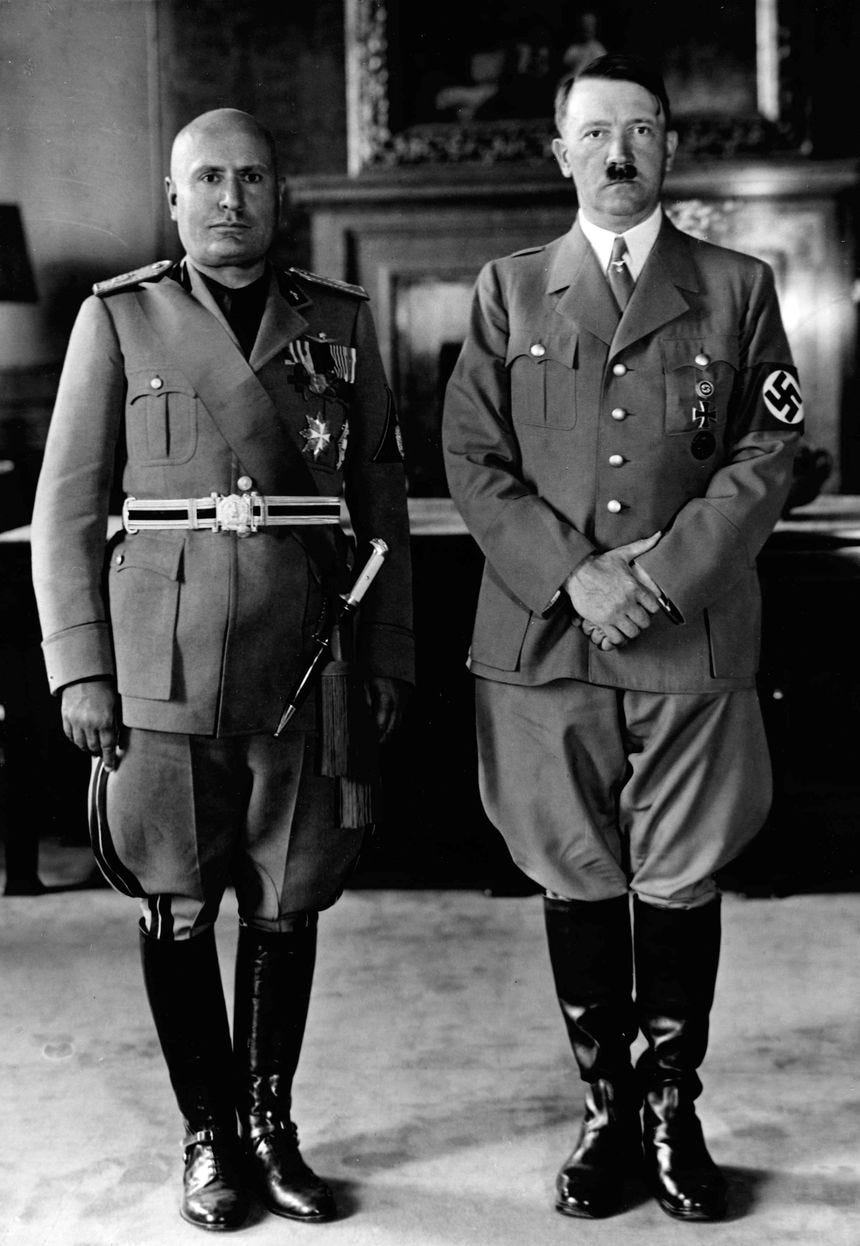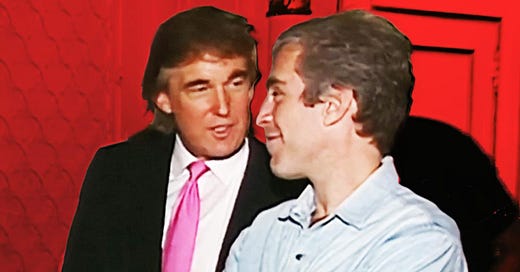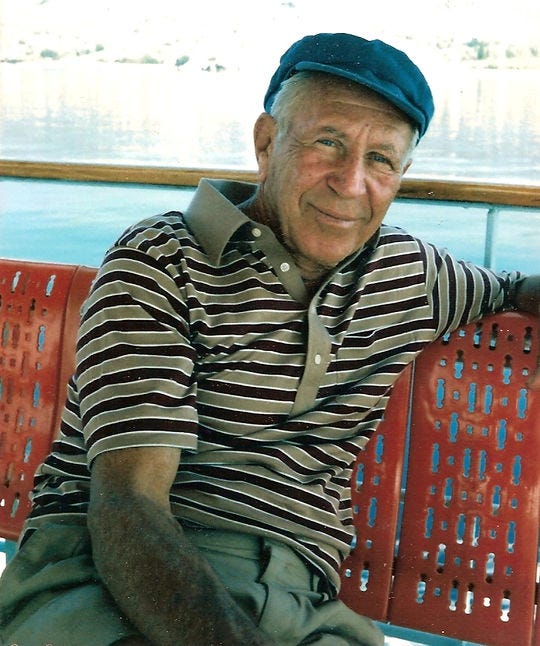I’m Not Going To Say Anything Bad About Donald Trump In Case I Have To Work With/For Him
American Fascism, Psychopathic Structure & Denial of Feeling

Social media and the mainstream media alike have been churning out constant noise about the awfulness of the Trump administration since January of 2025. We know Trump is a con artist and master manipulator. He’s a grifter and a narcissist (duh) with sociopathic leanings. His primary game is Mr. Wonderful. But is his political cult—surrounded by billionaires and far-right Evangelical Christians, what Chris Hedges calls American fascists1—indicative of a twenty-first century form of fascism?
Yet if the defining features of classical fascism included a fervent support of the statist organization of human interaction, a sincere belief in the existence of society, and a fervent endorsement of collectivism, it makes little sense to apply the term “fascist” to ideas that reject statism and society in favor of extreme libertarianism. 2
His followers will dismiss the inquiry as “fake news” and part of a “deep state” narrative to undermine Trump. This may have been the case in the past, but Trump is now surrounded by capitalist magnates who have oligarchic power, e.g., Bezos, Musk, Zuckerberg, etc. They are hell-bent on destroying the State (not strengthening it) and as the crisis of capitalism continues, historically it has been fascism that “saves” capitalism.

Trump’s existential life position is an arrogant one (obviously). Internally, he believes that everyone is a fool 3 and he is superior (“a genius”). Only Trump can “save” America. This is of course connected to Trump’s biggest personal fear, which is for him to look foolish himself. He must be in complete control at all times, e.g., his hair is perfect or he controls it with a hat. The forward lean at the edge of his seat plus the triangle shape he forms with his hands reveals his internal drive; “Be strong and be perfect.”

He must be in control and he is only in relationship based on a transactional opportunity to enrich himself or ascend to power, e.g., Elon Musk. The relationship is dependent on the person needing help from Trump and/or in order for Trump to dominate (“win”) them. This is why he is so paranoid: the fear of humiliation and mockery has hounded him his entire life. 4 This fear and inability to surrender relationally are two sides of the same coin. Despite his public histrionics and drive for attention, he needs to manage all emotions for total control. For example, in the 2020 race for the presidency he frequently used the terms “anarchy” and “anarchists,”5 which is the fear of collective mobilization (recall, he wasn’t a Black Live Matter fan…).
Interwar European fascism eliminated the private self as the public self became identified with the state regime. Trump is not building a strong state. He only cares about the state so much as he can use it transactionally and with that to grant him power to wield. In his first term, “[Trump] did not trust the state and did not try to build new institutions,” he used it to “further his own interests.” 6 This has been the neoliberal playbook since Jimmy Carter: no central authority and the building of a Mafia economy through hyper-individualism (bye bye altruism), which turns into self-branding. As self-absorption for self-optimization takes hold, we don’t notice that society has become a Mafia state:
For Hitler, fascists more broadly, and “tribal” cultures, the pursuit of individual self-interest is poisonous to overcoming the state of nature. Individuals can only thrive as part of a collective. Trump’s starting point is the exact opposite. For him, the pursuit of individual self-interest is paramount to all human existence. 7 […]
Everything is transactional. All interactions are worthless unless they come with the promise of monetary payback. This is why Trump finds notions of service, sacrifice, and heroism so difficult to understand. 8

Here is the comedian Anthony Jeselnik explaining the only thing he couldn’t say about Donald Trump during his 2011 “Comedy Central Roast of Donald Trump.” A hint: it wasn’t making fun of his daughter or wife or his lack of intelligence. In the clip below, Jeselnik talks about “What You Can't Say at Roasts.” Specifically, at 4 minutes and 58 seconds, he mentions when he roasted Trump.
“Ya know, Donald Trump said ‘You can’t say I have less money than I say I do’.”
-Anthony Jeselnik
His fear of being humiliated regarding his net worth is really about his self-worth. This is projected xenophobically onto the supposed hordes of “illegals” (intruders)9 and the evils of “communist” China. When someone manages to humiliate Trump he will self-destruct (hopefully) and be cancelled. Remember, Donald J. Trump played the Influencer game all the way into the White House in 2016 without previous experience in politics. All he did was repeatedly “break the internet” while manipulating TV audiences to create additional audiences and followers for himself.
Trump’s neurotic fears regarding himself are projected onto the nation (Make America Great Again) based on his sense of lack (ego). Trump is the only fake person more Ronald Reagan than Ronald Reagan.
As a psychotherapist, I study personality structure (mind) and character structure (body). These seemingly two things function as a unity. What feels like the internal (personality) is based on chronic tensions and muscular holding patterns in and around the body. In his 1933 tour de force, Character Analysis, Wilhelm Reich called this muscular “armor,”10 which blocks the free-flow of affect that allows for emotional surrender.
Alexander Lowen, MD was a former patient of Reich’s. He summarized the concept of “armoring.”
Armoring refers to the total pattern of chronic muscular tensions in the body. They are defined as an armor because they serve to protect an individual against painful and threatening emotional experiences. They shield him from dangerous impulses within his own personality as well as from attacks by others. 11
In terms of Trump’s character structure, there is a walling off of feelings (paranoia and self-righteousness aren’t emotions). More specifically the denial of feeling. The persona—literally, mask—is the only thing you experience with this structure. This involves the denial of feeling for oneself and also for the other, which is the primary characteristic of a psychopathic structure.

Internally, we can only imagine the relationship he had with his mother… Okay I’ll make a go at it. Historically, the “conscience” of this character structure predominantly comes from the opposite gendered parent, i.e., the mother. In Trump’s presentation we only see the self-interested (infantile) part of him, i.e., persona. This tells me that his “mother” (conscience) is walled off because he was seduced in some way by her. The pain and confusion of a seductive parent and its consequences are hard to fathom. The short version is a type of encrustation of the organism. Did Little Trump get the Art of the [Raw] Deal and now we only get the Little Fascist part of him?
Now, returning to the title of this post: as a self-employed therapist in a capitalist system, I’m expected to self-promote myself (as a solid self), because all of the global population is a potential customer (or “Follower”). Richard Seymour noted in his book The Twitter Machine that the social media industry—and the internet in general—appear to offer endless self-expression. However, this virtual system herds us in the direction of conformity: “The potential audience for anything posted on the internet is the entire internet.” Therefore, “The only way to conform successfully on the internet is to be unutterably bland and platitudinous.” 12
Therefore, I am not willing to say anything bad about Trump. Who knows, maybe he will be a paying customer. This capitalist imperative to become a “somebody” based on a contingent somebodyness that one has acquired (think “possession”) is what Zen refers to as delusion. The self is illusory.
To conclude, what Trump is doing is what every president since I was conceived has been doing. He is saying different things, but the outcome remains the same: “racial hierarchy at home and civilizational hierarchy and empire abroad.” 13 The question is not whether Trump is a “fascist” or not. He will be goosestepping in military fatigues if it in some way enriches him. The question is how do we address the American (and Israeli) subcurrent of radical nativism?

Hedges, C. (2008, c2006). American fascists: the Christian Right and the war on America. New York: Free Press.
p. 100, Editor, Rosenfield, G. D. & Editor, Ward, J. (Eds.). (2023). Fascism in America: Past and present. Cambridge University Press: New York.
Cassius, J. (1975). Body scripts: collected papers on physical aspects of transactional analysis. Unpublished.
p. 96, Editor, Rosenfield, G. D. & Editor, Ward, J. (Eds.). (2023). Fascism in America: Past and present. Cambridge University Press: New York.
p. 94, Editor, Rosenfield, G. D. & Editor, Ward, J. (Eds.). (2023). Fascism in America: Past and present. Cambridge University Press: New York. “Unlike Hitler, Trump used the term “anarchy” and “anarchists” time and time again, particularly in the 2020 presidential race. [70] His frequent use of the term, of course, also reflects his recognition that the fear of anarchy had the power to mobilize his base.”
p. 98 & 95, Editor, Rosenfield, G. D. & Editor, Ward, J. (Eds.). (2023). Fascism in America: Past and present. Cambridge University Press: New York.
p. 97, Editor, Rosenfield, G. D. & Editor, Ward, J. (Eds.). (2023). Fascism in America: Past and present. Cambridge University Press: New York.
p. 98, Editor, Rosenfield, G. D. & Editor, Ward, J. (Eds.). (2023). Fascism in America: Past and present. Cambridge University Press: New York.
p. 129, Editor, Rosenfield, G. D. & Editor, Ward, J. (Eds.). (2023). Fascism in America: Past and present. Cambridge University Press: New York.
Reich, W. (1945/1990). Character analysis. Third Edition. Trans. by Vincent R. Carfagno. Edited by Mary Higgins and Chester M. Raphael. Farrar, Straus and Giroux: New York.
p. 13, Lowen, A. (1975). Bioenergetics. Penguin Compass: New York.
p. 39, Seymour, R. (2019). The twittering machine. London: The Indigo Press.
p. 132, Editor, Rosenfield, G. D. & Editor, Ward, J. (Eds.). (2023). Fascism in America: Past and present. Cambridge University Press: New York.









